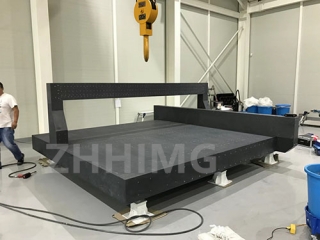Precision granite components are widely used in various industries due to their excellent physical and mechanical properties, such as high hardness, wear resistance, dimensional stability, and thermal stability. They play an important role in ensuring the precision and quality of mechanical equipment and instruments. However, many people are wondering if precision granite components require special maintenance to maintain their performance and longevity.
The short answer is yes, precision granite components do require special maintenance to keep them in good condition and prolong their service life. Although granite is a natural stone that is known for its durability and resistance to corrosion, abrasion, and chemical attack, it is still prone to damage and deformation if not properly taken care of. Here are some essential maintenance tips for precision granite components:
1. Cleanliness: Keeping the surface of granite components clean is of utmost importance. Dust, dirt, oil, and other contaminants can cause surface scratches, corrosion, and even bacterial growth. Use a soft, non-abrasive cloth or sponge to wipe the surface of the granite components regularly. Avoid using acidic or alkaline cleaning agents, as they can damage the polished surface or cause discoloration.
2. Protection: Granite components should be protected from impact, vibration, and sudden temperature changes. If possible, store them in a dry, ventilated, and stable environment, away from direct sunlight and moisture. Consider using shock-absorbing materials or pads when transporting or handling them to reduce the risk of damage.
3. Calibration: Over time, the granite components may experience dimensional changes due to wear, aging, or other factors. It is crucial to calibrate them periodically to ensure their accuracy and precision. Use a high-precision measuring instrument, such as a coordinate measuring machine (CMM), to check the flatness, parallelism, squareness, and other parameters of the granite components. If any deviation is found, take appropriate corrective actions, such as lapping, re-grinding, or replacing the components.
4. Maintenance records: Keeping a record of the maintenance history of the granite components is helpful for future reference and troubleshooting. Note down the date, method, and results of each maintenance activity, as well as any abnormal observations or problems. This can help detect potential issues early on and prevent more serious consequences.
In conclusion, precision granite components are essential components of many industrial applications, and their proper maintenance is crucial for their longevity and performance. By following the above-mentioned tips, you can ensure that your granite components stay in good condition and provide reliable service for years to come. Remember, prevention is always better than cure, and investing in maintenance today can save you from costly repairs or replacements in the future.
Post time: Mar-12-2024

